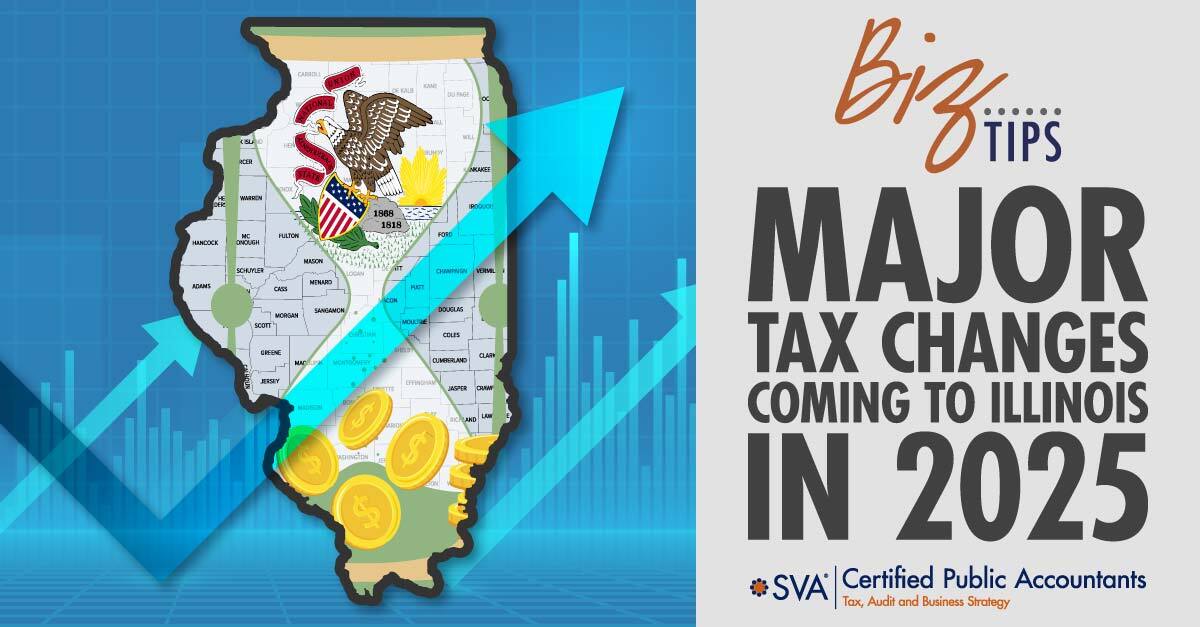Illinois has rolled out House Bill 2755, a sweeping new tax law that business owners and individuals alike should pay attention to.
Signed by Governor JB Pritzker in June 2025, the legislation doesn’t raise tax rates directly, but it does introduce big changes in how various state taxes are calculated, collected, and reported.
Here’s a breakdown of the most impactful changes and what they might mean for you or your business.
New Rules for Sourcing Pass-Through Entity Sales
If you’re involved in buying or selling interests in partnerships or S corporations, there’s a new sourcing rule you need to know about. Instead of being based on the seller’s residence, gains or losses are now sourced based on the Illinois apportionment factor of the entity being sold (unless it’s an “investment partnership”).
That means:
- The Illinois tax impact of these transactions will now depend on the average apportionment factor over the current and previous two years.
- This aligns Illinois with a growing trend among states using what’s called “investee apportionment.”
What to do: If you’re considering a sale or acquisition, it’s worth modeling how this change could affect your Illinois tax obligations.
GILTI Deduction and Add-Back Exceptions Take a Hit
Global businesses, take note. Illinois is making changes to how it handles global intangible low-taxed income (GILTI) and intercompany expenses:
- The GILTI deduction drops from 100% to 50%.
- Two key exceptions that used to soften the blow of “add-back” rules are being removed:
- No more exception if the related-party income was taxed elsewhere.
- No more exception for intercompany transactions priced at arm’s length.
What to do: If your business has international operations, you may see an increase in Illinois taxable income. Now is a good time to reassess your tax strategy.
Combined Reporting Shifts from Joyce to Finnigan
Illinois is switching methods for combined reporting. What used to be the Joyce method (counting only sales by Illinois-nexus members) will be replaced by the Finnigan method, where all group sales into Illinois count if any member has nexus.
For multistate or multinational groups, this could significantly increase Illinois sales factor apportionment.
What to do: Review your corporate structure and group sales exposure to Illinois. This shift may impact your effective tax rate.
Three New Tax Amnesty Programs
If your business has outstanding tax liabilities or questions around past compliance, Illinois is offering three limited-time amnesty windows:
| General Tax Amnesty |
Runs October 1 – November 15, 2025, covering most unpaid taxes from periods after June 30, 2018, and before July 1, 2024. |
| Franchise Tax Amnesty |
Same dates, but focused on franchise/license fees due after June 30, 2019, and before July 1, 2025. |
| Remote Retailer Amnesty |
Runs August 1 – October 31, 2026, for remote retailers with unreported Illinois sales between Jan. 1, 2021, and June 30, 2026. |
What to do: If you’re a remote seller or have back-tax concerns, you may want to participate. But with ongoing litigation on remote seller rules, timing your amnesty decision is key.
Sales and Excise Tax Changes
Illinois is tightening up and modernizing several tax rules:
- Marketplace Facilitators (including service platforms) now have to collect and remit sales tax.
- The transaction threshold is gone. Now only a sales threshold applies, aligning Illinois with most other states.
- Excise taxes are rising:
- Tobacco tax jumps from 36% to 45% and applies to more products.
- Sports betting and telecom services also face rate increases.
- Short-term rental tax expands to include Airbnb, VRBO, and similar platforms under the state hotel operator tax.
What to do: Service marketplaces and short-term rental hosts should review their sales tax compliance processes and update as needed.
What Didn't Make It In (But Could Come Back)
One proposal that was dropped before final passage was a 10% gross receipts tax on digital advertising. While it wasn’t included in H.B. 2755, this idea hasn’t gone away, and similar measures are being explored in other states. Keep it on your radar.
What's Next?
The Illinois Department of Revenue is expected to release further guidance in the coming months, but don’t wait to start planning.
Here are some smart next steps:
- Model the impact of pass-through entity sourcing and GILTI changes.
- Review your group’s sales factor exposure under the new Finnigan method.
- Evaluate amnesty opportunities if you have unpaid liabilities.
- Ensure sales tax compliance for marketplaces and rentals.
These updates may have far-reaching consequences depending on your business model and structure. If you have questions, now’s the time to start the conversation.
Need Help Navigating These Changes?
We’re here to help. Contact us to discuss how these updates may impact your tax planning and compliance.
© 2025 SVA Certified Public Accountants

